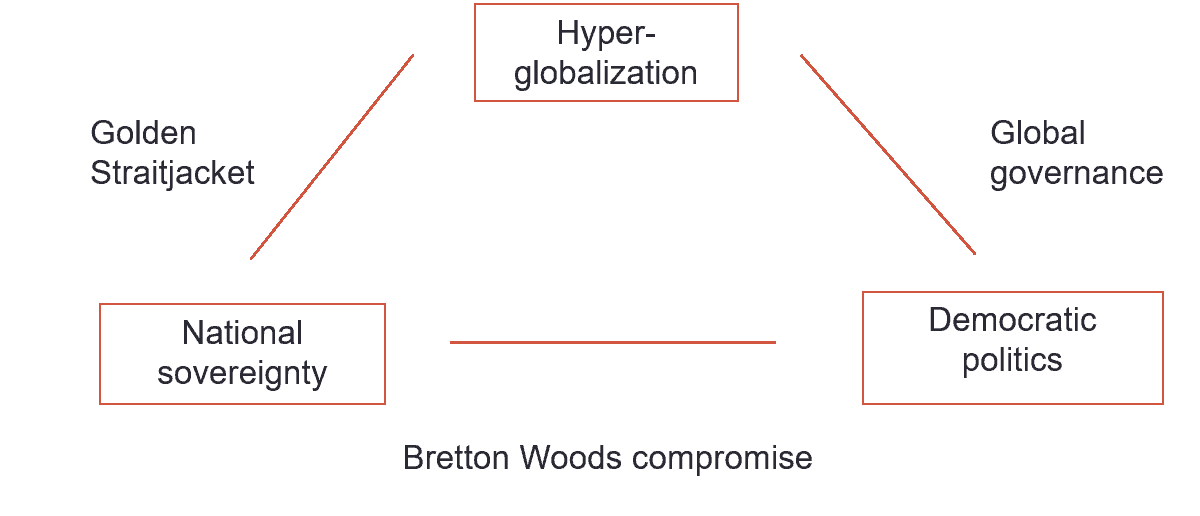Note: This article is the concluding post in a four-part series about growth.
Following World War II, the United States enjoyed unprecedented economic success as a victor of the war and the only major nation that did not suffer homeland infrastructure losses. In the US, the post-War period included an expansion of worker rights but hit a turning point in roughly 1968 which began the dismantling of those same rights. We now refer to the dominant monetary-economic philosophy of the past 30-50 years as “neoliberalism.” Among other things, it included a commitment to private sector deregulation, financialization, elimination of worker protections, and globalization of the labor economy.
In the UK and the United States, this paradigm was embraced whole-heartedly by the major political parties of the right and the left. As a worldview, it was in other words “hegemonic.” Envisioning alternatives outside a neoliberal paradigm was undiscussable if not unthinkable.
This paradigm has stopped working. The built-in error of neoliberalism was that it allowed capitalism to eat through vital social, political, and natural resources to such an extent that life became unlivable or unlikable for too many people within and outside the Western system. Voters on the left and right are increasingly voting the neoliberal establishment out, and activists and terrorists are attacking its built systems and moral authority.
Neoliberalism lives on, of course, but although it still controls attention and investment in some spheres, it is no longer a functioning paradigm or hegemony. The worthy debate at this point isn’t whether neoliberalism is good or bad, but what will replace it.
When an ideology breaks
“Thomas S. Kuhn wrote a seminal treatise about this back in 1962. He said what scientists do when a paradigm fails is… (guess what)… they carry on as if nothing had ever happened. If they don’t have a paradigm, they can’t ask the question. So they say, ‘yes, it’s wrong, but supposing it was right’… and the only other option open to them is to stop asking the questions.” – Elaine Morgan
In a democratic political system, society holds the state in check via elections, and the state holds the private sector in check via law. When the state ceases to set limits for the private sector, the private sector will innovate in ways that are massively disruptive to society (for better or worse). As the private sector begins to exert soft or hard control over the political process—and through it, society in general—democracy will give way to corporate oligarchy and corporate feudalism.
The danger as companies grow in search of new fuel—ever upwards, ever to the right—is that they begin to eat away at the social, natural, or political substrate. If they don’t, their competitors will, so it’s illogical to think that the private sector will police itself. Private sector organizations are not inherently benevolent: some government regulation, taxation, and basic social protections are essential to ensure that private sector growth is healthy for society in general. Unchecked capitalism does not lead to prosperity.
This should in no way be a surprise, as unchecked growth is bad for any complex system: it’s fatal for the original species if not the ecology as a whole. The word “growth” calls to mind for me not just a noble oak tree or flourishing forest, but also a cancer cell, the non-native ice plants that choke the shorelines of California, and the monster in John Carpenter’s The Thing that mutates through one grotesque incarnation after another. It’s both intelligent and moral for us to treat the word “growth” with a bit of skepticism and sensitivity to context.
Many people these days believe (with very good reason) that the world is falling apart. An alternate perspective, to borrow a phrase from Mark Epstein, is that it is instead “falling together”… in the sense that we are re-cohering and falling into place, a renewed sense of place.
The illusion of neoliberalism has collapsed, not just for those who protested it, but for everyone. With one illusion gone, we are able to see a bit more of reality, a bit more clearly.
What do we see?
A riddle resolved

Dani Rodrik first argued back in the year 2000 that democracy, deep economic integration, and the nation-state can never be equally sustained, and our tough choice is to pick which two we care about most. The end of the neoliberal era has knocked hyper-globalization out of the running, reverting the dominant paradigm to the “nation-state + democracy” axis that governed Western policy after WWII. This is in fact our only available option, as there are no current mechanisms to combine global democracy with a global labor force—nor, as Rodrik notes, would this be a win for social justice. (In a global democracy, minorities would always lose; the North American population would always outvote the Maldives.)
But this axis shift is only part one of how we are “falling together.” The current backlash against globalization has meant not only the rapid dissolution of trade agreements and other international ties, but also intranational disintegration into all-vs.-all social competition. We see this playing out in Brexit, in U.S. race relations, in Facebook’s turn towards private filter bubbles as its core design strategy, in the carving-up of the mediasphere and built environment, in myriad migration and refugee crises, in our politics in general, and most crucially in the widening gulf between the 1% and everyone else. For the private sector, this fragmented economic-social-political-physical landscape jeopardizes global supply and distribution chains, so ignoring or waiting out the storm is also not possible.
The freedom to make idiosyncratic, local choices also means that individual countries are free to abandon democracy or fail to embrace it. In an authoritarian political system, the state directly controls the private sector and society at large (for better or worse). Unchecked power in any system leads to fast, dislocating changes, whether that looks like Facebook, the Three Gorges Dam, or the recent purging of Poland’s Supreme Court.
The given of where we are right now in 2019 is that the riddle posed by Dani Rodrik can no longer be answered: the nation-state, democracy, and globalized labor are threatened increasingly (though not fatally) by transnational and intranational tribes. We can see, with a more subtle reading of history, that this has always been the case. What’s “really going on” in any event is weirder and bigger than what one can see through the lens of any one sector, discipline, industry, or subjective perspective.
We’re gonna need a bigger framework.
Believing what we know
“And so I knew. And next, of course, came believing it. Knowing it — knowing it’s true is one thing. But believing what you know… well, that’s the tough part.” – Edward Albee, The Goat, or, Who is Sylvia?
“Upton Sinclair wrote that it is difficult to get a man to understand something when his job depends on not understanding it. How does this work? Not as a direct psychotic foreclosure of a part of the subject’s knowledge but more in the guise of a fetishist denial: while the subject understands the thing very well, he suspends the symbolic efficiency of his understanding.” – Slavoj Žižek, The Courage of Hopelessness
I mention all of this as an ambivalent conclusion to my blog series on growth in general.
In a world that’s splintering into tribes and localities, we must assume that all actors in the system will make contextual, subjective, imperfect choices. We all participate in the current neoliberal system to varying degrees as consumers, workers, voters, citizens, protestors, investors, and community members. Imperfect human beings working in imperfect human situations make imperfect choices.
At the same time, I personally care about and want to work towards a new era of collective, positive social change. Today’s tribes and splinter groups may realign—quickly—in novel and socially positive ways, within and across sectors. New technologies hold enormous potential. I believe the most inspiring organizations in human history have yet to be created.
Inspiration, in fact, is a word that I think about a lot. In its etymology, it suggests both the breath and the divine. I always think of inspiration as connecting a person with their own breath, dropping them deeper into their own grounded reality. Inspiration, in other words, is not about filling another person with your own expelled air. (When I’m exposed to adrenalized, gushy marketing around “growth”—or really, anything else—I always pause and think: “What is this person or entity trying to sell me? What are they trying to sell themselves?”)
Many people struggle daily with the pain of believing things they know to be untrue, about their own moral goodness, their families, their workplaces, the world in general. This is understandable and very human, but ultimately, it’s much more efficient and effective to believe what we know, rather than believe things we know to be false.
Postscript
Every new subscriber to The Next Us newsletter receives the following message from me…
I recently had reason to remember the following definition of “intelligence” from the Hitchhiker’s Guide to the Galaxy text adventure game, created by Douglas Adams and Infocom:
“Thirty million generations of philosophers have debated the definition of intelligence. The most popular definition appears in the Sirius Cybernetics Corporation android manuals: ‘Intelligence is the ability to reconcile totally contradictory situations without going completely bonkers — for example, having a stomach ache and not having a stomach ache at the same time, holding a hole without the doughnut, having good luck and bad luck simultaneously, or seeing a real estate agent waive his fee.'”
May we all be able to navigate contradictory realities with grace.


Leave a Reply